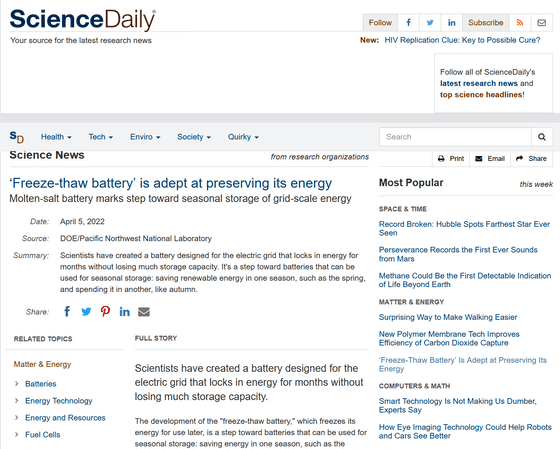The possibility that a 'freeze-thaw battery' that freezes and stores energy will realize a seasonal power supply

The
'Freeze-thaw battery' is adept at preserving its energy: Molten-salt battery marks step toward seasonal storage of grid-scale energy --ScienceDaily
https://www.sciencedaily.com/releases/2022/04/220405084551.htm

'Freeze-thaw battery' stores electricity long-term for seasonal release | E & T Magazine
The freeze-thaw battery being developed by DOE and others first heats and melts materials such as salt, aluminum, and nickel, generates chemical energy by flowing ions through the liquid electrolyte, and then cools it to room temperature. It stops the movement of ions, stops the chemical reaction, and saves it. When energy is needed, it can be heated again.

At the experimental stage, the freeze-thaw battery was in a state where 92% of its capacity was maintained after 12 weeks. Guosheng Li, who led the research, said that he is focusing on 'reducing the cost of the battery', and if the research progresses and the material can be changed from nickel to iron, '1kWh' at the experimental stage The cost of 23 dollars (about 2850 yen) per unit can be reduced to 6 dollars (about 740 yen) per 1kWh, which is about 1/15 of the existing lithium battery.
In addition, the theoretical energy density is higher than that of existing lead-acid batteries, and it is expected that the batteries can be made larger in capacity and smaller. With this freeze-thaw battery, wind and hydropower plants, which previously could only store energy for a short period of time, will be able to store energy for a longer period of time, saving electricity in the windy summer. It may be possible to store until winter when electricity demand peaks.

'This study represents an important step towards cross-season battery utilization that pushes the boundaries of today's battery technology,' said Imre Gyuk, director of energy storage at DOE.
Related Posts:







